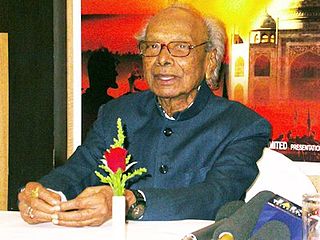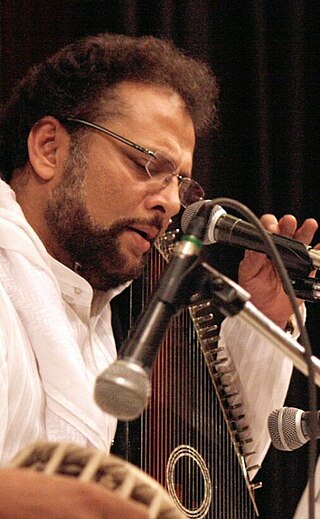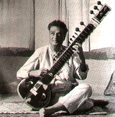
Naushad Ali was an Indian composer for Hindi films. He is widely considered to be one of the greatest and foremost music directors of the Hindi film industry. He is particularly known for popularising the use of classical music in films.

Thumri is a vocal genre or style of Indian music. The term "thumri" is derived from the Hindi verb thumuknaa, which means "to walk with a dancing gait in such a way that the ankle-bells tinkle." The form is, thus, connected with dance, dramatic gestures, mild eroticism, evocative love poetry and folk songs, especially from Uttar Pradesh, though there are regional variations.

Prabodh Chandra Dey, known by his stage name Manna Dey, was an internationally acclaimed and celebrated Indian playback singer, music director, and a musician. As a classical vocalist, he belonged to the Bhendibazaar Gharana and was trained under Ustad Aman Ali Khan. He is considered one of the most versatile and celebrated vocalists of the Hindi film industry, often credited with the success of Indian classical music in Hindi commercial movies. As a musician, Dey is best known for infusing Indian classical music in a pop framework that ushered the golden period in Hindi cinema.

Ustad Ghulam Ali is a Pakistani ghazal singer of the Patiala Gharana. He has also been a prominent playback singer in Bollywood. Ghulam Ali was a disciple of Bade Ghulam Ali Khan. Ali was also trained by Bade Ghulam Ali's younger brothers – Barkat Ali Khan and Mubarak Ali Khan.

Ustad Bade Ghulam Ali Khan was an Indian vocalist, from the Patiala gharana.

Shobha Gurtu (1925–2004) was an Indian singer in the light Hindustani classical style. Though she had equal command over pure classical style, it was with light classical music that she received her fame, and in time came to be known as the Thumri Queen, and for the 'Abhinaya' sung in her full-throated voice.

Prabha Atre is an Indian classical vocalist from the Kirana gharana. She has been awarded all three of the Padma Awards by the Government of India.

K. J. Yesudas is a multilingual singer, singing Indian classical music, devotional, light music, and film songs. His commercially published recordings span multiple genres.

Vani Jairam was an Indian playback singer in Indian cinema. She is fondly referred to as the "Meera of modern India" Vani's career started in 1971 and has spanned over five decades. She did playback for over one thousand Indian movies recording over 10,000 songs. In addition, she recorded thousands of devotionals and private albums and also participated in numerous solo concerts in India and abroad.

Begum Parveen Sultana is an Indian Hindustani classical singer of the Patiala Gharana. She was awarded the Padma Shri in 1976 and the Padma Bhushan in 2014 by the Government of India and the Sangeet Natak Akademi Award by the Sangeet Natak Akademi in 1998.

Raza Ali Khan is an Indian classical vocalist of the Patiala gharana.
Khamaj is a Hindustani classical Music raga within the Khamaj thaat which is named after it.
In South Asia, semi-classical music is derived from Hindustani classical music that is often combined with filmi music.

Swami is a 1977 Hindi Indian romance drama film directed by Basu Chatterjee and produced by Jaya Chakravarty. The film stars Shabana Azmi, Vikram, Girish Karnad and Utpal Dutt. Hema Malini and Dharmendra made guest appearances together in the film. The film's music is by Rajesh Roshan. The film was shot in location in Dahisar, Mumbai and the Dahisar River Banks.

Jaspinder Narula is an Indian singer of playback, classical and Sufi music. She is known for her work in Hindi and Punjabi cinema. She shot to fame after the duet "Pyaar To Hona Hi Tha" with Remo Fernandes from the 1998 film Pyaar To Hona Hi Tha for which she won the 1999 Filmfare Award for Best Female Playback Singer. The other notable films she has sung in include Mission Kashmir, Mohabbatein, Phir Bhi Dil Hai Hindustani and Bunty Aur Babli. She is also a singer of Sufi music, as well as Gurbani and other Sikh religious music. She has sung a latest Hindi Music video "Maula Ali Ali" with Mudasir Ali.

Abdul Halim Jaffer Khan was an Indian sitar player. Khan received the national awards Padma Shri (1970) and Padma Bhushan (2006) and was awarded the Sangeet Natak Akademi Award for 1987.
Babul Mora Naihar Chhooto Jaye is a popular Hindustani classical music song (thumri) in Raag Bhairavi.
Ustad Barkat Ali Khan was a Pakistani classical singer, younger brother of Bade Ghulam Ali Khan and elder brother of Mubarak Ali Khan, and belonged to the Patiala gharana of music.

Sachin Dev Burman was an Indian music director and singer. A member of the Tripura royal family, he started his career with Bengali films in 1937. He later began composing for Hindi movies and became one of the most successful and influential Indian film music composers. Burman composed the soundtracks for over 100 movies, including Bengali films and Hindi. Apart from being a versatile composer, he also sang songs in the light semi-classical and folk style of Bengal. His son, R. D. Burman, was also a celebrated music composer for Bollywood films.

Zohrabai Ambalewali was an Indian classical singer and playback singer in Hindi cinema in the 1930s and 1940s. She was considered one of the most popular female playback singers of early and mid 1940s.















